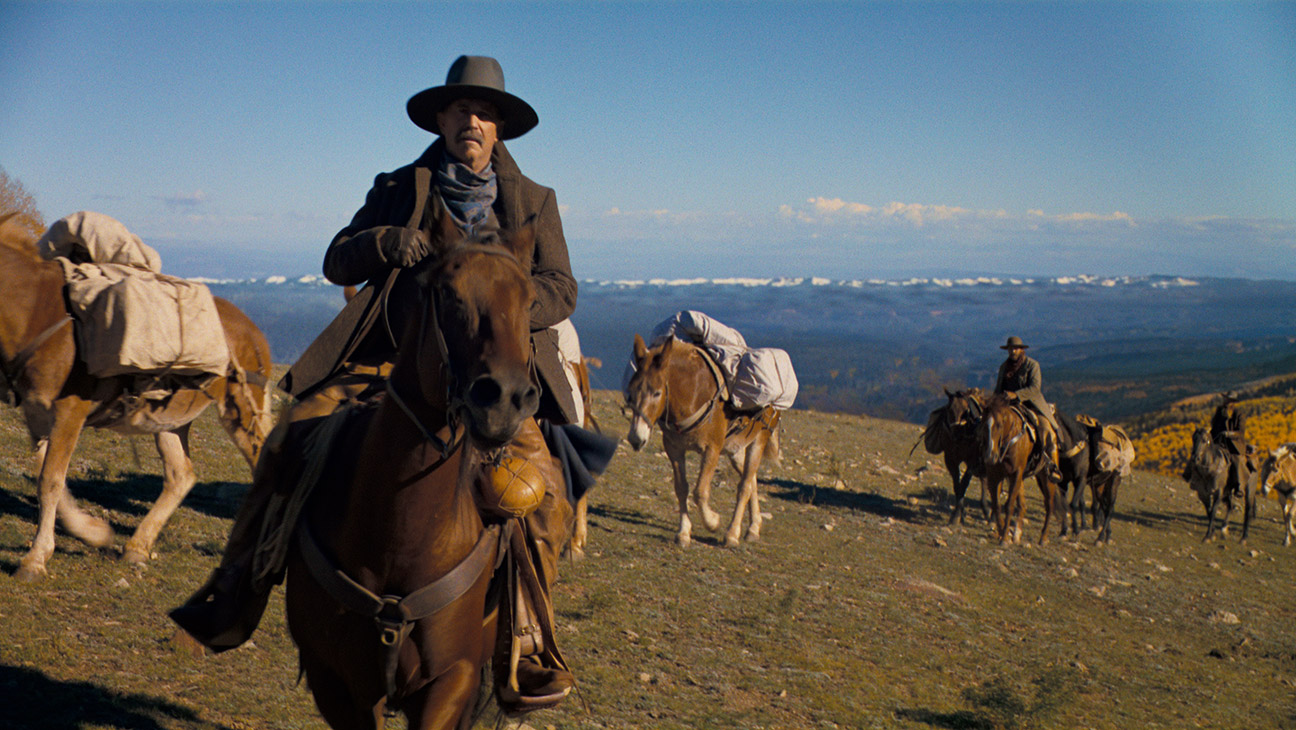Kevin Costner returns to the genre that won him his Best Director and Best Picture Oscars (1991, Dances with Wolves) with an insanely ambitious passion project in which he directs, produces, and stars—and into which he poured $50 million of his own money. The film is subtitled “Chapter 1” because it’s the first part of a planned four-part theatrical epic. The second part will arrive on August 16.
Horizon: An American Saga—Chapter 1 follows American pioneers across the states making their way to the Wild West, only connected by their dreams of a better life. One is an enigmatic cowboy (Kevin Costner) who tries to protect a woman of questionable repute (Abbey Lee) and the child she raises. Another is a sharpshooter mother (Sienna Miller) and her family trying to survive in a new settlement despite the threat of native tribes. Others are the native tribes trying to figure out how to deal with the arrival of these pioneers, and American soldiers (Sam Worthington, Danny Huston, Woody Harrelson) trying to keep the peace. Then there’s the leader of a wagon train (Owen Wilson) trying to get difficult people to their destination. These individuals, though most don’t know each other, will together shape the future of the American West.
A big part of Horizon’s magic is how it feels both big and personal, dramatizing the idea that ordinary people made their mark on the wide open spaces of the last frontier. This balance of nailing both epic scale and intense intimacy with a large cast of characters is no mean feat (as evidenced by the failure of a movie like Babylon to do so). But Costner manages it by means of (1) a three-hour runtime that enables the film to adequately introduce and develop these characters and settings; (2) deft camerawork that balances and captures both the big spaces and the individual characters; and (3) perfect pacing and editing that spend just long enough on each moment without lingering. The result feels lavish and unrushed, yet you never get the sense that screen time is being wasted or the narrative is being padded out. (Something, it should be noted, that even Dennis Villeneuve’s otherwise great Dune movies couldn’t manage.) Much of the credit also must be given to the all-star cast, who flawlessly bring these characters to life with a casual ease.
It’s clear that Kevin Costner loves westerns as much as any fan does. All the classic genre tropes are here: from the very satisfying Costner turn as the rough-but-goodhearted gunslinger to the sharpshooting single mom, the nasty villains, the wide-open spaces, the heartbreaking storyline, and the classic values of family, masculine chivalry, and feminine kindness. All are portrayed with an enthusiasm such that they will scratch the itch of any western enthusiast, yet tempered with an adult’s understanding of the underlying tragedy of the West.
With such a long runtime and so many characters, it would be easy for such a movie to feel like a self-indulgent and unfocused vanity project. And while it leans that way at times, what ties the epic together is a very strong theme—delivered point blank by Col. Hough (Danny Houston)—about the dream of Americans for wide open spaces to chart their own destiny despite danger to themselves and harm to others. This theme is then reinforced by the individual character arcs and even the choice of camera shots (which expertly cut between closeups of the characters and the wide spaces they long for). Such unity between plot, character, theme, and aesthetics is not easy to find in the average Hollywood film and prevents Horizon from ever losing focus by wallowing in details, the way Quentin Tarantino’s Once Upon a Time in Hollywood did.
Again, the film is not without its flaws: it ends abruptly with a teaser for the next part in this four-part saga without offering the audience any real catharsis after all it’s been put through. It feels more like the pilot of a TV show than a self-contained feature film. Of course, that’s sort of baked into the cake with a movie that has “Chapter 1” in the title. But other movies have had satisfying first parts: consider Fellowship of the Ring and the first part of Dune.
A bigger issue is that the film doesn’t deliver a satisfying “why” for its characters or story that would make me eager to return to this world three more times. The film tells me that the settlers are going West for freedom and self-determination, but it never explains what any individual character’s dream is. We know how much Frances Kittredge cares about protecting her family, but we don’t know why she and her husband risked their lives on this journey in the first place. We know that Matthew Weyden wants to keep order on his wagon train, but we don’t know why he decided to run a wagon train. The movie exposes us to the characters’ emotions moment to moment, but leaves the deeper driving motivations for their adventures out west on a personal level unexamined. So the only “why” we’re given is what we’re told about the collective motive for the western expansion: selfishness—a longing for freedom, yes, but a self-centered freedom at the expense of others, like the Native Americans they’re displacing. It’s hard to root for the “heroes” if the filmmaker is telling us that, at heart, they’re the bad guys. Can I be entertained by such a paradox in a well-made three-hour movie? Sure. For three more three-hour movies? That’s asking for a lot of trust on the audience’s part.
Lacking a “why” is a common problem with modern film and TV in general, and makes many of
our stories unnecessarily shallow. Napoleon never bothered to explain what drove the Little Corporal’s insane levels of ambition. Angel Studios’ film about Mother Cabrini never focused on why Cabrini was so passionate about her social activism. Shogun never bothered to establish what its lead actually found so compelling and meaningful about his Western culture, so it didn’t have as much emotional impact when he traded it in for his new Eastern one.
This is likely a big part of why the western genre collapsed in the ’60s and ’70s. Previous generations of Americans believed that American values had made the world a better place. After all, the generation that made westerns a hit was the generation that saved the world from the Nazis during World War II. So for all the bad in westward expansion, we still had an underlying gladness that America became America, which balanced all things out. But the cultural changes in the ’60s and ’70s meant that later generations didn’t feel that same gratitude for America’s existence. It’s no coincidence that Star Wars became such a smash hit in the ’70s, since it was basically a western (remember the gun-slinging Han Solo?) but set in a far, faraway galaxy that didn’t have any complicated relationship with our actual history. This may be why so many of the most popular movies since then have also been sci-fi or fantasy: if you don’t believe there are heroes in your own world, you have to find them in made-up ones.
This is also why westerns like Yellowstone and concepts like patriotism have become so divided on political lines. It’s hard to say that America brought anything uniquely good to the world without sounding like a conservative. Adam McKay called famous liberal West Wing showrunner Aaron Sorkin a “right wing version of me” because he doesn’t portray America’s institutions as bad to their core like McKay does.
People may bemoan that every movie right now is a superhero movie. But until filmmakers produce equally compelling and reality-grounded heroes for fans to cheer for, and reasons to cheer for them, fans will continue to go where the heroes are. Likewise, people might bemoan the lack of trust in our institutions. But until it is bipartisan to promote and defend them—even if it sounds right-wing to do so—they can’t really complain when people walk away from them.
Flaws aside, Horizon: An American Saga—Chapter 1 is beautifully filmed, the acting is flawless, and the scope is both vast and heartbreakingly intimate. It’s a film that fans of the genre will want to see on the biggest screen possible. If it could only have dug deeper into the “why” for its characters and the Wild West in general, we might have had a genuine modern classic on our screens.

